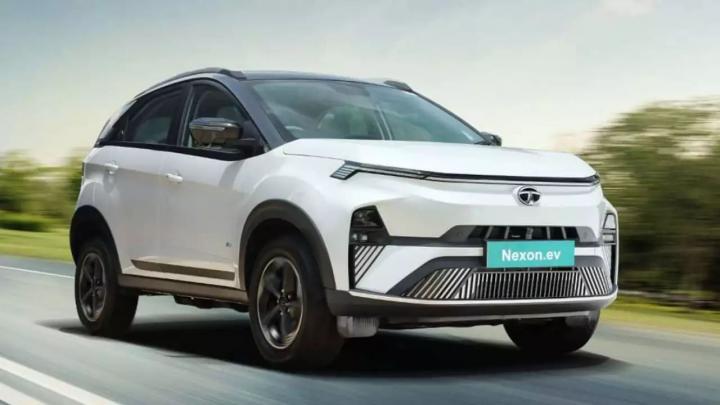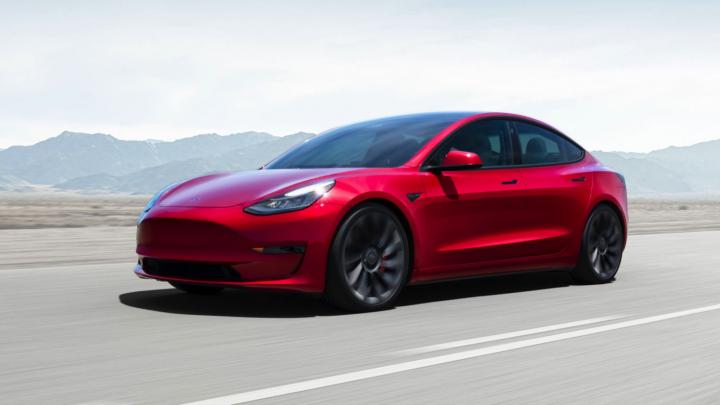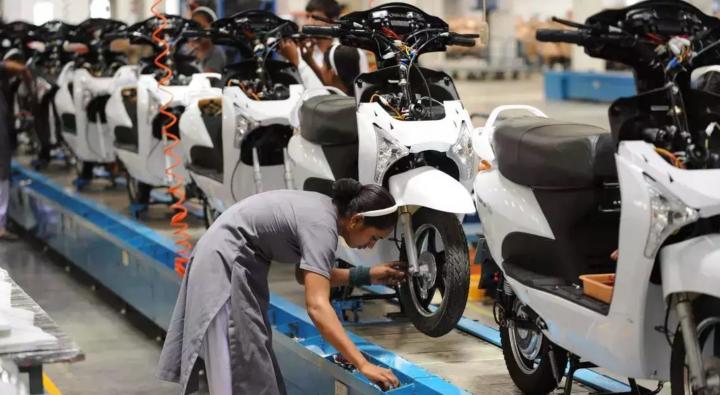News
No plans to offer tax cuts on EV imports to Tesla: Govt
PLI schemes for advanced chemistry cell battery storage with a budgetary outlay of Rs 18,100 crore have been approved.
The government has clarified that it is not considering any proposal to provide tax concessions on the import of electric vehicles into the country.
The Minister of State for Commerce and Industry, Som Prakash, said, “Presently there is no proposal either to provide exemption from local value addition cost or to provide subsidy on import duty on import of EVs in India.” He was responding to a question regarding proposals to exempt brands like Tesla from local value addition of cost in heavy batteries, semiconductors and magnetic parts as well as import subsidies on EVs.
The minister said that the production-linked incentive scheme for the automobile and auto component industry was aimed at providing financial incentives to boost domestic manufacturing of advanced automotive technologies, including EVs and their components.
The government is also said to have taken steps to boost domestic and foreign investments in India to enhance local value addition under the 'Make in India' initiative. PLI schemes for advanced chemistry cell battery storage with a budgetary outlay of Rs 18,100 crore have been approved.
US-based EV maker Tesla has been in discussions with the government demanding a reduction in import duties. Commerce and Industry Minister Piyush Goyal visited the Tesla factory in Fremont, California last month, where he stated that the company would be doubling its auto component imports from India.
Source: ET Auto
News
Govt. to offer cashless medical treatment to accident victims
The government’s strategy for road safety consists of 5Es - Education, Engineering, Enforcement and Emergency Care.
The Ministry of Road Transport & Highways (MoRTH) plans to introduce cashless medical treatment to all injured accident victims across India within the next 3-4 months.
The amended Motor Vehicle Act 2019 has provisions for free and cashless medical treatment to injured victims. According to Anurag Jain, Secretary, MoRTH, some states have implemented it, but the ministry now plans to roll out the scheme across India.
“It is envisioned for providing access to cashless trauma care treatment for road accident victims at the nearest appropriate hospital in the country, in accordance with the Supreme Court ruling, and by drawing its power from the Motor Vehicle (Amendment) Act 2019,” Jain said. “Such cashless treatment shall be extended to road accident victims, including during the golden hour,” he added.
It is part of the government’s strategy for road safety, which consists of 5Es - Education, Engineering, Enforcement and Emergency Care.
Source: ET Auto
News
FICCI submits proposal for FAME III scheme to the Govt.
FAME III will support the adoption of 30.5 million EVs across segments, and also help achieve the target of 30% electrification of India’s transport sector.
The Federation of Indian Chambers of Commerce and Industry (FICCI) has submitted its proposal to the Ministry of Heavy Industries for the continuation of the Faster Adoption and Manufacturing of Hybrid and Electric Vehicles (FAME) scheme.
FICCI has urged the government to continue the incentives offered for the faster adoption of EVs for the next 5 years, with a review at the end of 3 years. It is said that a sudden discontinuation of price incentives would lead to an increase in the prices of EVs by up to 25%. The current FAME II scheme is ending in March 2024.
EV penetration in India is only 5%. As per FICCI, it is imperative to continue the FAME scheme to achieve the overall target of 30% set by the government of India by 2030. It has been estimated that if demand incentives as suggested are provided for the next 5 years, it would support the adoption of 30.5 million EVs across segments, and also help achieve the target of 30% electrification of India’s transport sector. The incentives can be tapered down and eventually discontinued over the next 3-5 years as prices of batteries and EV components reduce further.
Key features of FAME III as recommended by FICCI:
- Subsidy support, in the form of upfront incentive in the form of price reduction to EV customers, should ideally continue till EV penetration crosses a threshold value in each segment, and to allow critical mass to be achieved towards India’s stated goal of a minimum of 30% as a whole, to bring benefits of this technology to the masses.
- There can be a mid-scheme review at the end of 3 years, to assess the penetration achieved and calibrate the scheme or slabs of incentives.
- Technology:
-FAME 3 to continue with all xEV (SHEV, PHEV passenger cars) technologies as in FAME 2
-Upcoming green technologies which significantly aid carbon reduction i.e. hydrogen, and fuel cells, may also be considered for certain incentives, post discussion with stakeholders.
- Vehicle segments: In addition to supporting demand creation for the priority segments of public transport (eBus, E3W, e-taxi) and E2W, FAME-III may also include segments like MHCV (trucks); personal segment for e4Ws and private buses.
- Incentive calculation based on battery size may continue (per Kwh) as per FAME II.
- Localization: Manufacturing clauses under the Phased Manufacturing Program (PMP) can be continued with the continuation of other FAME II quality parameters.
- Maximum vehicle price eligibility criteria and Incentive cap as a maximum percentage of vehicle price to continue towards supporting Affordable EVs.
News
Tesla and Govt. of India close in on an agreement
An official announcement could be made during the Vibrant Gujarat Global Summit in January.
Tesla Inc. and the Indian government are close to finalizing an agreement that would enable the US-based EV maker to import its electric cars into the country from next year.
According to a media report, an official announcement could be made during the Vibrant Gujarat Global Summit in January.
Tesla is also looking to set up a factory within the next 2 years. The states of Gujarat, Maharashtra and Tamil Nadu are said to be under consideration as they already have well-established EV ecosystems and export infrastructure.
The report also states that Tesla could commit to an initial investment of around US$2 billion. The company would also increase the purchase of auto parts from India to around US$ 15 billion. The carmaker could also manufacture batteries locally to bring down costs.
Piyush Goyal, Minister of Commerce and Industry, was on a visit to the US to participate in regional trade meetings and to woo investments from EV markers. Reports also suggest that the government could offer tax cuts on imports of completely built units (CBU) of electric vehicles for a period of up to 5 years.
Goyal also visited Tesla’s manufacturing facility in Fremont, California.
Source: ET Auto
News
Govt. may reduce import duty on green cars to 15%, but there's a catch
The government will also take guarantees from the companies towards creating an ecosystem for suppliers.
According to a media report, the government of India may create a policy for technologically sophisticated vehicle manufacturers like Tesla. In a bid to promote local manufacturing, the government could reduce the import duty on green cars.
Reports suggest that import duty on green cars may be reduced from 100% to 15% if the carmakers agree to manufacture their vehicles in India. The government will also take guarantees from the companies towards creating an ecosystem for suppliers, with around 20% of parts being sourced locally in the first 2 years and up to 40% by the fourth year.
The current customs duty policy does not differentiate between electric cars and ICE-powered vehicles. Hence, brands like Tesla, BMW and Audi want EVs to be categorized separately from luxury cars.
Tesla has been in talks with the Indian government seeking tax benefits. The negotiations hit a roadblock in 2021 when the government insisted on committing to local manufacturing. Renewed talks were held in 2023 after the EV maker shared plans to set up a manufacturing base.
Source: ET Auto
News
Govt. may roll out Phased Manufacturing Plan for high-end EVs
Tesla could set up a base in India through the PMP or FAME schemes.
According to a media report, the government of India may roll out a Phased Manufacturing Plan (PMP) type scheme in order to attract global EV makers like Tesla.
It is said that the PMP scheme would promote local manufacturing by offering incentives for building an ecosystem within the country. It would not only help meet demand but would also boost exports.
Reports suggest that the government is looking to set up a graded duty structure to boost domestic manufacturing while protecting the interests of domestic players like Tata Motors and Mahindra. This is also expected to help fast-track the transition towards EVs.
Tesla could set up a base in India through the PMP or FAME schemes. The company has already expressed its interest to bring its entire ecosystem, including vendors to India. It has been reported that the US-based EV maker is looking to set up a manufacturing unit with a capacity of around 5 lakh units per annum.
BMW is also said to be in talks with the government. The carmaker has proposed duty-free import of EVs for three years, after which it would invest in a manufacturing unit. BMW is willing to refund the import duty benefits extended by the government in case it cancels the investment plan.
News
Chinese EV maker BYD under the lens for tax evasion in India
The Directorate of Revenue Intelligence (DRI) alleged that the carmaker underpaid tax of US$ 9 million.
Chinese EV maker BYD made headlines recently after its US$1 billion investment proposal was blocked by the Indian government. According to the latest reports, the carmaker is now under investigation for alleged tax evasion.
BYD is said to have paid less tax on imported car parts used in the vehicles assembled by the company in India. The Directorate of Revenue Intelligence (DRI) alleged that the carmaker underpaid tax of US$ 9 million. While BYD has since deposited the sum, reports suggest that the investigation could lead to additional tax charges and penalties.
Chinese investments have been on the radar of Indian agencies since border tensions flared up between India and China back in 2020. Last month, BYD cancelled its investment plan after the proposal was rejected by the government of India. The carmaker had proposed to set up an EV manufacturing unit in partnership with Megha Engineering and Infrastructures.
BYD is the largest producer of EVs and plug-in hybrid vehicles. It currently offers the Atto 3 electric SUV and e6 MPV in India.
Source: ET Auto
News
SUVs and MPVs to get costlier as GST cess hiked by 2%
The government has maintained the lower 15% cess rate on hybrid vehicles.
The GST Council met for the 50th time this week to discuss a long-standing loophole that allowed certain models to avoid high compensation cess levied on SUVs. The government has now clarified the definition of UVs, which include SUVs, MUVs and crossovers.
According to the revised definition, 22% cess would be levied on SUVs, MUVs and crossovers with lengths exceeding 4,000 mm, engine capacity exceeding 1,500cc and unladen ground clearance of 170 mm and above.
This means sedans with a ground clearance of 170 mm or more will not come under the higher cess bracket. Sub-4 meter crossovers, midsize SUVs and MPVs with engines smaller than 1,500cc will attract lower compensation cess. The government has also maintained the lower 15% cess rate on hybrid vehicles.
How will this affect vehicle prices?
SUVs and MPVs like the Mahindra XUV700 and Toyota Innova Hycross will get costlier by 2%. However, the hybrid Innova Hycross and the Maruti Invicto would benefit from the lower cess rate, making them more popular in the long run.
Source: TOI
News
Govt. proposes third-party motor insurance premiums for FY2024
The government has proposed a minimum premium of Rs 2,094 for private cars below 1,000cc.
The Ministry of Road Transport and Highways (MoRTH) has issued the draft third-party motor insurance premium and liability rules for FY2024.
As per the notification, the ministry has proposed a premium of Rs 538 for 2-wheelers up to 75cc. The premiums for 2-wheelers up to 350cc and above range between Rs 714 and Rs 2,804.
The government has proposed a minimum premium of Rs 2,094 for private cars below 1,000cc. The rates for cars between 1,000-1,500cc and cars above 1,500cc have been set at Rs 3,416 and Rs 7,897, respectively.
The proposed rate for commercial vehicles other than 3-wheelers and not exceeding 7,500 kg is Rs 16,049. The rates for vehicles up to 40,000 kg and above range between Rs 27,186 and Rs 44,242. The premium for goods carrying motorized 3-wheelers and motorized pedal cycles except e-carts is Rs 4,492.
For private electric cars not exceeding 30 kW, the premium rates have been proposed at Rs 1,780 and for 30 kW-65 kW vehicles, the proposed rates are Rs 2,904 and for EVs exceeding 65 kW is Rs 6,712.
The proposed rates for electric 2-wheelers not exceeding 3 kW is Rs 457, for 3 kW-7 kW is Rs 607, for 7 kW-16 kW is Rs 1,161 and for 16 kW and above is Rs 2,383.
For electric goods carriers other than 3-wheelers not exceeding 7,500 kg, the proposed rate is Rs 13,642, for 7,500-12,000 kg vehicles is Rs 23,108, for 12,000-20,000 kg is Rs 30,016, for 20,000-40,000 kg is Rs 37,357 and for those exceeding 40,000 kg is Rs 37,606.
The government has also proposed a discount of 15% for buses used by educational institutions, 50% for privately registered vintage cars, 15% for EVs and 7.5% for hybrid vehicles.
The draft rules have been prepared in consultation with the Insurance Regulatory and Development Authority of India (IRDAI).
Source: ET Auto
News
Govt to penalize e-scooter makers guilty of FAME II violations
The government has sent notices to seven EV makers to recover nearly Rs 500 crore.
The Government of India is planning to penalize electric scooter manufacturers that have been found guilty of wrongfully claiming subsidies under the FAME II scheme.
According to a media report, the government is considering several measures, including banning these companies from availing subsidies in the future as well as blocking the subsidy on vehicles sold over the last 15 months. It is said that the Ministry of Heavy Industries would discuss this with other departments of the government before finalizing the penalties as it would have an impact on investments.
Earlier, the government sent notices to seven EV makers including Hero Electric, Okinawa Autotech, Ampere EV, Revolt Motors, Benling India, Lohia Auto and AMO Mobility to recover nearly Rs 500 crore. The centre had also suspended subsidy disbursal of Rs 1,400 crore to 13 companies that were being investigated by the ARAI.
Meanwhile, companies that have been cleared of any wrongdoing should receive a subsidy by the end of this month. According to a government official Rs 200 crore has already been paid and the pending claims would be cleared by month's end.
Source: ET Auto
Pages




.jpg)








